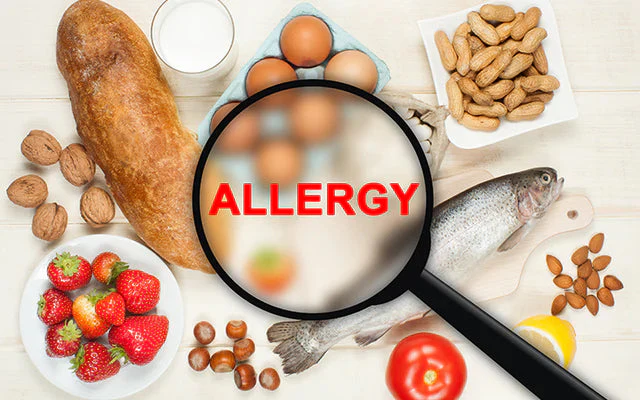When Food Becomes a Threat : One Bite, Two Realities
Edition : Widad wahbi
In the bustling streets of Cape Town, a mother watches anxiously as her child cautiously nibbles on a peanut butter sandwich, aware that this simple act could trigger a severe allergic reaction. Thousands of miles away, in a New York City classroom, a teacher scans the room for EpiPens, mindful of the increasing number of students with food allergies. While food allergies are a growing concern worldwide, their prevalence and nature differ markedly between Africa and the United States, painting a complex picture influenced by environment, lifestyle, and genetics.
In the United States, food allergies have reached alarming levels. Approximately 10.8% of adults-over 26 million individuals – are affected, with common culprits being shellfish, milk, peanuts, tree nuts, and fish. Among children, nearly 8% are diagnosed with food allergies, translating to about one in 13 children, or roughly two in every classroom. The rise in these figures over recent decades has prompted widespread concern among healthcare professionals and parents alike.
Contrastingly, in Africa, the landscape of food allergies presents a different narrative. Data is scarcer, but studies indicate a lower prevalence compared to Western nations. In urban areas of South Africa, for instance, the prevalence among children is reported at 2.5%, with raw egg white, cooked egg, and peanuts being the most common allergens. However, in rural regions, the figures drop significantly, with only 0.5% of children affected. This stark urban-rural divide underscores the influence of environmental and lifestyle factors on the development of food allergies.
The reasons behind these regional disparities are multifaceted. The “hygiene hypothesis” suggests that reduced exposure to infections and microbes in early childhood, more common in developed regions like the U.S., may lead to an increased risk of allergic diseases. In contrast, higher exposure levels in many African regions might confer some protective effects against the development of food allergies. Dietary practices also play a role; differences in diet, including the timing and diversity of food introduction during infancy, can influence the development of food allergies. In some African communities, traditional dietary practices may involve earlier introduction of a variety of foods, potentially impacting allergy prevalence.
Moreover, genetic predispositions combined with environmental factors, such as pollution and climate, may affect immune system development differently across populations. Urbanization in Africa, for example, has been associated with lifestyle changes that could influence allergy prevalence. Additionally, disparities in healthcare access and public awareness can impact the diagnosis and reporting of food allergies. Limited access to healthcare services in certain African regions may lead to underreporting and underdiagnosis of food allergies.
Understanding these differences is not just an academic exercise; it has real-world implications for public health strategies. In the U.S., efforts are focused on managing a high prevalence of food allergies through education, labeling laws, and emergency preparedness. In Africa, particularly in urban areas where prevalence is rising, there is a pressing need for increased awareness, improved diagnostic facilities, and context-specific management plans.
As globalization continues to blur the lines between regions, and urbanization accelerates in developing countries, the patterns of food allergies may evolve. Continuous research and surveillance are essential to adapt public health initiatives that address the unique challenges posed by food allergies in diverse settings.
-

Libya: Delayed Municipal Elections Finally Held in Seven Northwestern Towns
Edited By : Tendai Zola Libyans in seven municipalities in the country’s northwest were finally able to cast their votes on... Politics -

Africa: Fight for Justice Over Bolloré’s Ports Empire
Edited By: Fatimatou babdinA coalition of African civil society groups has launched a landmark legal battle in Paris, seeking accountability... Economy -

The Fight to Bring Africa’s Art Home
Edited By : Widad WAHBIFor over a century, thousands of African artifacts, including masks, statues, and royal thrones, were taken... Video -

Bijagós Islands: A Hidden Cultural and Ecological Gem Emerges from Obscurity
Edited By: Fatomatou konèOff the coast of Guinea-Bissau lies the Bijagós Archipelago, a scattering of more than eighty islands where... Chosen for you -

How Nigerians Reinvented an Italian Tinned Tomato Brand
Edited By: Widad WAHBI In the bustling food markets of Lagos, a shopper points to a bowl of rice and asks,... Culture -

Congo Prosecutor Demands Death Penalty for Ex-President Joseph Kabila
Edited By: Tendai Zola A Congolese prosecutor has requested the death penalty against former President Joseph Kabila, who is being tried... Politics

 Follow the latest news on WhatsApp
Follow the latest news on WhatsApp  Follow the latest news on Telegram
Follow the latest news on Telegram  Follow the latest news on Google News
Follow the latest news on Google News  Follow the latest news on Nabd
Follow the latest news on Nabd 

















